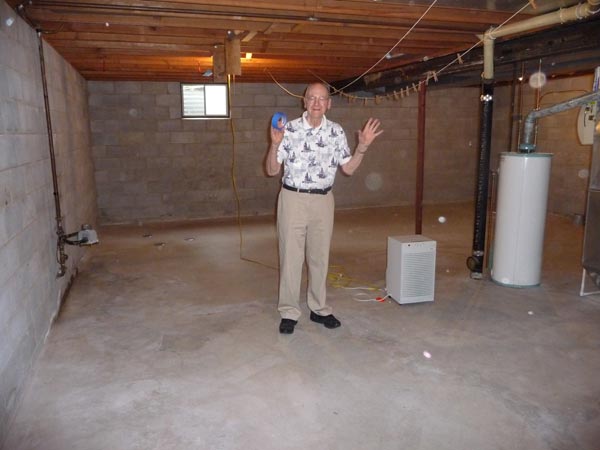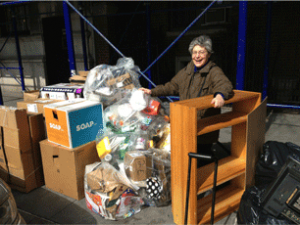
Box of clothes, shoes, and housewares for donation (Image Credit: Gsalr)
What’s the real value of stuff we don’t need? We all think we should get lots of money for selling stuff we no longer need on Ebay. But beware! Simplification does not mean monetization! Our stuff has value way beyond money.
Did you grow up, as I did, with Depression-era parents, grandparents, or other influential people? And did you learn from them that it’s fine to simplify and get rid of things but that everything has value and it is your job to extract that value from each and every item? I know the answer to that question. It’s yes. I offer as proof eBay and Craigslist.
Every item in our homes or lives has a ‘mental value’ and that value is calculated in our minds. It’s usually ‘close to what we paid for it’ or ‘a lot more because it’s now a collectible’. And that value — and the potential to monetize it — often paralyzes our ability to part with items.
What My Father Taught Me About Selling My Unwanted Stuff
So now I want to tell you a story of my then 85 year-old father quietly shutting down his 4 bedroom house to move into an apartment. And I want to show you what my Depression-raised father taught me about the fallacy of selling stuff on Ebay. His house had no more than most for its size, but it was still 4 bedrooms, a living room and a family room, and formal and casual dining area. That is a lot of furniture, and a lot of stuff.
Initially, as the ‘right-hand daughter’ instead of right-hand man, I sought to get an inventory of things, and find comparable items on Craigslist, to sort items value and donate those of less value, and spend the time to sell the items that clearly had value. I walked dad through the list of things that fell into those camps. And he said to me words that will forever echo in my brain: “You are under the impression that selling stuff on Ebay and Craigslist is the right approach. It isn’t”. He proposed the following thinking.
Imagine the Home You Want to Live in In the Future
For my dad, it was a one-bedroom apartment with den. Then imagine what can realistically and usefully fit into that space. Check those items for functionality. If they are not the best of their type, replace them with something else that can do the job more reliably. Then set those useful needed items aside.
Then look at everything else. What in that group can you simply not live without emotionally, no matter how irrational the choices?
Set the Emotional Items Aside and Donate Everything Else
Now look at everything left. Is there anything in that group that has a value of $500 or more? Set those items aside. Take everything else and donate it.
Call a charity whose aims and beliefs align with yours, and ask them to send someone over with strong arms and legs and let them remove the items to charity. As you watch items leave the house, don’t regret the $100 imagined value of that chair or table; instead imagine the grateful person who perhaps lost their home to a flood receiving this item, or finding it in a thrift shop. Put that grateful smile of their discovery in your mind.

Donate your stuff to organizations such as the Salvation Army or Goodwill (Image Credit: PutThisOn.com)
Imagine What it Would Take to Sell the More Valuable Items
Before the truck leaves, give the driver a soda pop, ask him to wait just a moment, and return to the house. Review your imagined items that have $500 or more in value. Now imagine what it will take to sell that stuff on Ebay or Craigslist. You will have to post them online, accommodate people both trustworthy and not into your home or property to view the items, you will have to negotiate prices, often diminishing the value of the item before your eyes.
Now revisit the face of the grateful smile of discovery of someone else finding this in their home or thrift shop for some ridiculously low price. Call the person from the truck back into the house and have them take all of the ‘stuff you thought had value’ away.
Bring the Realistically Useful Stuff and Your Mementos With You
And that is exactly what my Depression-raised father did. There is a family in his home town who now has an almost fully furnished house due to his generosity. They lost their home to a fire. They now have another home with furnishings in it. He knows that (not who they are, just that they exist). And he has mentioned a few times that he’s at peace with ‘giving it all away’.
Stuff Hangs Around in our Homes Because We Think It Has Value
What we don’t calculate is how we’re denying someone else the pleasure of using that item that otherwise sits in a corner, or a box, or in a storage unit across town.
Learn from my dad. Just imagine the face of someone discovering this item for their use, and recognize that the value they derive is larger than the value you might get by selling that stuff on Ebay.






Loved this! I am determined to clean out the attic, basement and garage attic of all the stuff we carried to CT from ATL. Corporate move means they paid for all of it to be transported. But, I think it’s a bunch of baggage! Thanks for sharing. Winter is long…I should be able to get through it all and face Spring with a new attitude! That, and a paint job, will make the house feel lighter and brighter.
Hope to see you sometime. T–
T – thanks for the great note. Corporate moves often create the mess you’re talking about, and aren’t talked about enough. I had the same problem throughout my many moves…if they pay to move it, there is no benefit to lightening up along the way. It can end up as messy as someone who like my dad lived 30 years in one place.
I’m glad the article provided some inspiration for you – all the best for your cleanup efforts!
Hi Ann,
I really enjoyed your post and your concept of finding value helping others as opposed to making a few bucks on Craigslist or eBay. My experience with eBay has been frustrating in general, I find that I often have to accept less money for items than I like, leaving me disappointed rather than relieved. This has caused me to use the site less and less. However, as a recent graduate, it concerns me to give things of value away when I can make money off them to pay for loans, rent, food and other expenses.
I’d love to hear some ideas on how I can exchange or sell these items so that I can retain some sort of value — even though I do understand that the feeling you get when giving something away is potentially worth it!
Thanks for the thought provoking post.
Best,
David
David, thanks for the comments!
You point out such a terrific issue – the “trade for” world. Each community seems to have its own way to work through this, so I’m not a terrific source for you particularly, but I can share what I’ve done.
first off, if you have a person/group you’ve worked with a lot in the past, ask about a trade. An example from my dad’s situation: when his cleaning lady realized that he was going to be getting rid of a lot of things, she mentioned she’d like first dibs on some things. Dad said sure, and then negotiated house cleaning time for the items. Everyone won.
Secondly, an approach I’ve used is to have a charity I was already going to work with – perhaps a faith community group – and instead of providing a check or cash I donate items to their sales. Again – exchanging items with value to otherwise cash paid out situations.
In some instances, up in Vancouver BC for example, there are exchanges that assist this process, attempting to match work you might need with things you might be willing to trade. That last option is “clunky”, and depending on what you’re offering or what you want, it can be a dead end.
thanks for reading! Ann
This article is a great guide for anyone who has to move an elderly family member into a smaller dwelling, as I have just done. It took some convincing my non-thrift store shopping family members that donating grandma’s un-needed things was the best use of our time, and the right thing to do, and in addition re-assuring grandma that her treasured things were going to someone who would use them. If my sis and I hadn’t stepped in to help her define needs vs wants, then divide up her most treasured possessions among ourselves first, all the remaining things would probably have been kicked to the curb. It took a few trips in my pickup, but tons of useful items (in like new condition) were hauled to the local Salvation Army.
Adrianne, what a wonderful post. It sounds like you and your sister handled things tremendously – balancing the dignity of your grandma and the needs of family members with the opportunity to provide for others in need through the process. I appreciate you taking the time to share your experience!
ann
Pingback: Getting organized: what to do with all of your stuff | ftedailygreen
Ann – I was particularly struck by the truth in your statement: “…that value — and the potential to monetize it — often paralyzes our ability to part with items.” I feel as if we live in an age where most everything is given a price, and monetary assessments often beat out other forms of valuation.
What you describe here is something that I would call “gift value.” Though I am nothing close to an economist, I think that gift giving evokes some sort of multiplier, which increases the value of an object tenfold (or maybe a little less ☺) if given as a gift, to account for the worth of making someone else happy.
Thank you for sharing the story of your father. I am sure he has created an excess of happiness with his donations. Next spring-cleaning I will be sure to emulate his process. In the words of my favorite ice cream parlor, Coldstone Creamery, whose cone sizes range from “like it,” “love it,” to “gotta have it,” I will save space in my stomach for banana split sundaes, and only save space in the closet for things I gotta have.
Amanda:
Wow. Just wow. Love your “builds” to the ideas in the piece. All the best to you during your next spring cleaning – and beyond.
I think this is such a great message that young people like myself really need to come to terms with. I know that my own experience as a student was filled with instances of trying to sell items that were not worth the trouble and I realize after reading this would have had much more value through donations! Books are a great example of this…they’re rarely worth enough to make it worth it to find a seller (maybe if you have a first-edition or signed copy, but the $5 paperback can really go), and if you donate to a library, that book can multiply its value by reaching multiple users.
Ann, you’ve definitely inspired me to look at my apartment this weekend and see what I can donate to a home that needs it more than I do!
Kaycee, what a cool note! You had such a rich connection to the story…love it. All the best in that apartment exploration! I did a quick “run around” this week myself, and found two shirts and two linens that I just never use. what am I thinking? They’re in a tote to drop at the donation center next time I head that direction!
This really reminded me of a similar experience I went through after my grandmother died. She was a collector and she collected items that covered almost every inch of her two bedroom house. Our garage was piled up with correspondences, collector’s plates, small figurines, and tons of clothing. I had the notion of selling some of the collector plates on Ebay or taking them for appraisal so my mother and I spent a lot of time looking into their value. It turned out most were replicas and maybe a few of the tin plates were worth something. We ended up cleaning them and hanging them around our house. The sentimental value was greater than the financial value in almost all of my grandmother’s items so we kept what we wanted, ran a garage sale for what was left, and ended up donating most of her possessions to Goodwill or Purple Heart. Like you, I felt it wasn’t worth it to sell on Ebay because it was more meaningful to donate it. Plus it gives you that nice glow and altruistic feeling for a while after!
Emily, how true! First, figure out what you want – but be highly creative about what that means. Dishes can make a lovely border around the top of a room. My mom used to have irons used to hold doors open. We all use favorite cups not for beverages but for pens and other assorted items. Creativity rules!
Pingback: Tips To Teach Your Kids To Be Grateful | Women Lifestyle Guru
“Stuff Hangs Around in our Homes Because We Think It Has Value”
This line really struck a chord with me. Having just gone through a move with my family, I wish I had seen this article before. We held a garage sale to help get rid of some of our extra things. We sold a bunch of things, but the whole time I held back on my stuff because I felt like I was losing something even though I hadn’t touched most of it in years. Thinking back on it now, I realize how silly that is. Now I know that the real value in it all lied in the potential happiness it could have brought to people with a greater need for it than me. Oh well, at least I know moving forward what to do with all my extra “stuff”.
Michael
What a lovely posting. Isn’t great when an idea gels in our head and suddenly becomes clear? Good for you to come to a place of comfort about “stuff”. I know what it’s like to struggle with perceived value. All the best to you on your journey!
Pingback: One Boston Day - How Will You Make A Difference? | The Paper Store
Pingback: 18 Ways to Keep Your Bedroom Clean - Wrapped in Rust